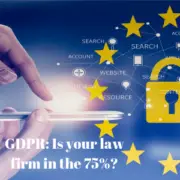GDPR: Is Your Law Firm in the 75%?
Cybersecurity for Your Law Firm
In November 2017, it was reported that 75% of UK law firms aren’t ready for the General Data Protection Regulation (GDPR). With less than three months to go until the compliance deadline of 25th May 2018, it is more important than ever for law firms to be prepared.
The legal sector is already highly regulated, with firms needing to comply with money laundering obligations, for instance. However, we have encountered some firms who believe this degree of regulation means they will already comply with GDPR. This isn’t true. Compliance with GDPR requires its own preparation, auditing, and changes to systems and policies surrounding the processing and storing of personal data.
General Data Protection Regulation (GDPR)
GDPR places greater responsibility on organisations to review third-party agreements for compliance too. Depending on your current processes and use of third parties, this could take significant time and resource.
As a firm, you must decide if you need to appoint a Data Protection Officer, based on criteria specified in the incoming legislation, as well as reviewing (or in some cases, implementing) your data protection policy, data breach notification procedure, subject access request forms and procedures, data protection impact assessments, and consent forms.
If you aren’t sure where to begin, the Law Society is collating guidance and support to help law firms prepare for GDPR.
Cybersecurity remains as important under GDPR as it is under the current data protection framework. The legal sector is an especially attractive target for cybercriminals seeking the sensitive data and significant funds held by law firms. Alarmingly, 62% of law firms reportedly suffered a cybersecurity incident last year.
Here are three ways you can protect your law firm from cybersecurity attacks:
Cyber Training for your Law Firm staff
Every member of your firm is responsible for protecting your data. This is why it is essential to educate your staff through cybersecurity training. From spotting attempted social engineering attacks, to understanding the risk posed in finding an unidentified USB, being able to identify risks and threats could prevent a successful attack against your firm.
Secure email
Standard email is not a secure option for law firms. Unencrypted emails travel through servers located all over the world. Anyone who intercepts these communications will have access to the information being sent.
Law firms are especially likely to send emails containing sensitive information. Secure email is essential for the legal sector and has come a very long way, offering both security and convenience. Our trusted partner provides an encrypted email service that protects messages from unauthorised access and renders e-mail trusted and binding, making ordinary email compliant with GDPR.
Secure file sharing for your Law Firm
The legal sector relies on document sharing. A secure file sharing system will protect your important documents and the sensitive data you hold. Cloud services such as Dropbox and OneDrive do not encrypt your documents, leaving you vulnerable to an attack on the cloud storage provider or access requests by government authorities. Through our partnerships, we also offer a secure file sharing solution. Utilising end-to-end encryption and anonymised key management via a trusted third party, all data is securely stored within the UK.
Would you like to discuss GDPR or cybersecurity for your law firm? We’d be happy to help. Contact us on 0844 586 0040 or email [email protected].




